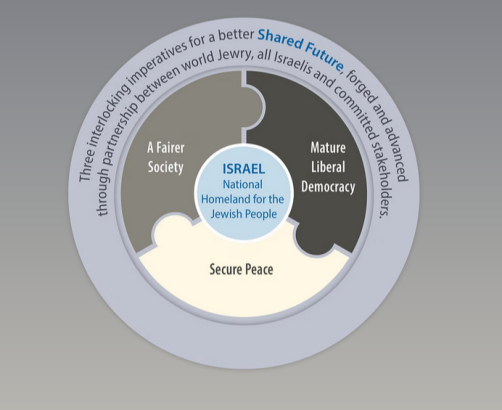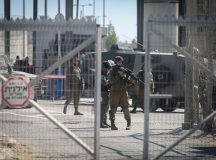Sir Mick Davis and Mike Prashker explain the rationale behind their newly launched London Initiative, which aims to reframe the Israel-Diaspora relationship through support for liberal forces in Israel.
For those committed to the Zionist vision set out in Israel’s Declaration of Independence, fifteen years of almost uninterrupted Netanyahu governments have represented an increasingly unbridled assault on all the essential elements of the Declaration.
It has been a deeply painful and destructive period that has tarnished Zionism, with the current government being the most distressing and damaging to-date. The Declaration’s aspirational vision of Israel, as a national homeland for the Jewish People, delivering ever greater fairness and equality to all its citizens and striving for peace with its neighbours has been badly set-back. It is telling that Israel’s foundational document has become a rallying-call of protest against the government’s divisive actions rather than the symbol of broad national consensus that it long represented.
Since the barbaric Hamas attack of 7 October 2023, the attention of both Israelis and world Jewry has been consumed by its continuing consequences; prolonged wars against Hamas and Hezbollah, the fate of the hostages, attacks from Iran and Yemen, an erosion of Israel’s standing and legitimacy within the community of nations and a global surge in antisemitic hatred.
The trauma and shock caused by the attack have been enormous. Its scale, brutality and far-reaching consequences within the region and beyond are a chilling reminder of the severe security and geo-political realities Israel still faces.
But the democratic and societal crisis that predated 7 October has not gone away. The government of Benjamin Netanyahu, which includes outspoken and proudly racist, expansionist, messianic, homophobic and misogynistic elements – elements he has legitimised at the heart of Israeli politics – has not revised its ambitions. The judicial coup it launched in January 2023 remains a strategic stepping stone to achieving them, by emasculating Israel’s democratic gatekeepers, most prominently the Supreme Court. Nor have Netanyahu and his coalition been held accountable or taken responsibility for the failures of October 7; failures that skewered their fatally flawed assertion that the conflict could be indefinitely ‘managed’.
Meanwhile, as war continues in Gaza, and members of the coalition plot its resettlement, various degrees of occupation and expanding Jewish settlement across the West Bank enter their fifty-eighth year, with renewed talk of annexation along with escalating violence.
Unsurprisingly, Israel’s democratic outlook – like its economic outlook – has been downgraded by reputable international agencies such as V-Dem and Israel Democracy Institute.
While Hamas’s savage assault and the ensuing multi-front war brought a surge of justified and much needed moral and material support from much of world Jewry, over time the savage realities of the continuing conflict, the widespread destruction of Gaza, growing settler violence, the continuing erosion of Israel’s democratic foundations and a range of anti-pluralistic policies, reinforce long-term trends that should alarm every Zionist. Namely, deteriorating relations between Israel and world Jewry and the free-fall of Israel’s international standing among most Western allies and democracies.
As passionate liberal Zionists we remain committed to advancing Israel towards the lofty vision of the Declaration of Independence. Its values are timeless, inalienable, non-negotiable and critical to the moral and strategic well-being of Israel, Israelis, world Jewry and the Jewish People.
Currently, when Israel is being dragged back from decades of stubborn if uneven progress to advance the vision of the Founders, it is essential to empower and motivate all who share our concerns to halt this descent and renew progress towards the foundational vision.
With this in mind, we have recently co-founded The London Initiative which is setting out to build a network of 360 accomplished philanthropic, institutional and thought leaders from Israel, world Jewry and like-minded international allies.
We aim to contribute to all those already working to strengthen the democratic fabric of Israeli society, to advance societal fairness and especially at this darkest of times, to support all striving to advance secure peace with the Palestinian people.
Happily, our research review (conducted by a team at Molad – the Center for the Renewal of Israeli Democracy, led by Dr Shai Agmon, which aggregated and compiled data from close to 100 reputable sources according to London Initiative specifications), has confirmed that these liberal values are shared to varying degrees by millions of like-minded Israelis and Jews around the world.
The London Initiative differs from other important efforts in several ways, not least by fully including Arab Palestinian citizens of Israel. Arab Palestinians comprise around twenty per cent of Israel’s citizenry. This makes their full partnership in shaping a better future – for all Israelis, between Israel and world Jewry, and between Israel and the Palestinian people – a Zionist, democratic and strategic imperative, and a great opportunity.
While Network members will be invited from diverse communities and backgrounds all will share our deep commitment to advancing the State of Israel as envisaged in the Declaration of Independence and hence the strategic advancement of three imperatives:
- Strengthening Israel as a mature liberal democracy
- Advancing a fairer shared future for all citizens of Israel
- Reviving hope and legitimacy for the advancement of secure peace with the Palestinian people notwithstanding the many obstacles
Critically, we believe that these three imperatives are too frequently addressed as if separate issues.
But the pursuit of mature liberal democracy, societal fairness and secure peace are in fact inextricably linked. History, prophetic wisdom and any number of studies demonstrate their intimate inter-dependency, even while the directions of causality are complex and varied.
The London Initiative will work to acknowledge and reinforce this connectivity.
All Network members will also agree – if sometimes for different reasons – that these three imperatives can be more effectively addressed through unprecedented partnership between like-minded citizens of Israel, world Jewry and other international change-makers.
The Triangle
We refer to the interconnectedness of mature liberal democracy, societal fairness and secure peace as ‘the Triangle’. A triangle connecting three critical elements vital to Israel’s future, its partnership with world Jewry, its security, sustainability and place in the world which are better advanced through an integrated approach.
Imagine, for example, a hospital in which cardiologists, neurologists, pulmonologists and other specialists, rarely consult and cooperate on treatment plans for a patient or even consider the impact of their treatment plan on other vital organs. This is clearly an inadequate and often dangerous way to deliver patient care.
But for a variety of reasons – an understandable desire to focus, fear of distraction and dilution of impact, limited resources, the complexity of collaboration and measurement, risk-aversion and more – philanthropists, institutional and thought leaders often work in rigidly defined issue and portfolio silos.
We must acknowledge and take responsibility for our role in the Triangle’s damaging deconstruction. Security experts might view peace activists as naïve ‘peaceniks’. Peace activists probably sometimes clump security experts together as bellicose militarists. Many NGOs and philanthropists who focus on democracy and societal fairness have tended to avoid peace. They often argue that the top priority is to ‘fix’ Israeli society and that peace is too divisive; that the time is not ripe.
Secure peace efforts have also been marginalised with many NGOs and philanthropists preferring lower-risk and more controllable projects that are independent of macro political processes over which they have no control. Government bullying and sanctioning of NGOs and threats to philanthropy have been worryingly effective.
Many are even cautious of working robustly to defend Israeli democracy, let alone calling the occupation ‘occupation’ or condemning growing settler violence, racist and extremist policies and the government’s role in shaping and driving them all.
The accumulative result of all these processes is that we invest in the three areas unevenly and we frequently operate in separate silos, with our own conferences, NGOs, philanthropic communities and interest-groups.
The London Initiative approach is not that everyone should be doing everything, but that we should all have much greater lateral awareness and coordination in recognition of the reality of an inter-locked Triangle of mature liberal democracy, societal fairness and secure peace.
Shifting the Overton Window
For those concerned by Israel’s current direction of travel to be effective in changing its course, we must be cognisant and raise awareness of the direction and degree of movement. Rather like air travel, rapid ideological movement in a time of darkness cannot be felt by those in collective motion.
Isolated by war and collective trauma, many Israelis struggle to come to terms with how far we have travelled from our foundational values. Likewise, many Jews around the world, appalled by the horrors unleashed by Hamas and galvanised in their support for Israel and besieged by rising antisemitic antizionism, struggle to process or acknowledge the shifts threatening the Israel they cherish as a source of pride and identity.
Partly explained but in no way justified by the horrors of war, the shift is such that it is currently more acceptable in widening circles for a government minister to advocate ‘voluntary emigration’ and the resettlement of Gaza than it is for an opposition leader to assert that secure peace with the Palestinians is in Israel’s strategic interests. Yair Golan, leader of the Democratic Party, former IDF deputy chief of staff and a man who single-handedly saved many lives on October 7, was recently labelled a ‘traitor’ by Likud MK Nissim Vaturi. Populists do not do shame.
The Overton Window is named after the American policy analyst Joseph Overton and describes the parameters of ideas and policies considered acceptable in a society at a given time. Gradually at first, and then rapidly, Israel’s Overton Window has moved to the extent that ideas and language that were once unthinkable are now increasingly mainstream. Moving rapidly through all the degrees of change that Overton theorised, Israel’s Overton Window has shifted to the extent that what was until quite recently almost ‘unthinkable’ and ‘radical’, has become increasingly ‘acceptable’ and ‘sensible’ and increasingly ‘popular’. From there, according to Overton, the distance to actual ‘policy’ is short.
Itamar Ben-Gvir’s presence in the current government as Minister of National Security, replete with his long criminal record, is a symptom of how far Israel’s Overton Window has shifted, making the until recently unimaginable into reality.
The rise of Ben-Gvir is well charted by Calev Ben-Dor on this site. Mainstream Israeli politicians used to shun Ben Gvir’s ideological hero, Meir Kahane. Likud leader, Yitzhak Shamir used to walk out of the Knesset when Kahane spoke. Now Ben Gvir and his fellow extremist, Bezalel Smotrich, hold ten percent of seats in the Knesset, key government portfolios and an effective veto over the day to day lives of all Israelis (and millions of Palestinians), with immeasurably damaging consequences for them all and for world Jewry.
Shifting the Overton Window back from the once unthinkable and towards a consensus recognisable in Israel’s Declaration of Independence requires all of us who are concerned to take individual and collective responsibility. It will require unprecedented and bold partnership between like-minded Israelis, world Jewry and international allies. It will require – as both a Jewish-Zionist right and obligation – that a critical mass of hitherto unheard liberally-minded Jews around the world find their voices to defend aligned values and interests. It requires us to stand up or allow this ignoble and dangerous situation to stand, with all the ongoing harm it facilitates to Israel as the national homeland of the Jewish people and Jews everywhere.
Conceptual Clarity and Confidence in The Integrative ‘Triangular’ Approach
At a time when all concepts are being contested and purposefully mangled by populists, it is important to provide conceptual clarity regarding the three elements of the Triangle. This conceptual clarity facilitates more effective and coordinated action. Furthermore, in the case of Israel it also important to add that together with its other advantages, the integrated approach is underpinned – one might say endorsed – by prophetic wisdom.
Mature liberal democracy
In Israel, as in much of the western world, many misleadingly promote the idea of democracy as ‘majoritarian’ (unrelated to the defence of minority rights), ‘ethnic’ (legitimately favouring Israel’s 80 per cent Jewish majority) or even, oxymoronically ‘illiberal’ (in which a democratically elected government erodes the rights and freedoms that underpin a nation’s democratic health, such as free media and independent courts.) Specific to the Israeli context, democracy is also routinely misrepresented in certain quarters as inherently at odds with Judaism.
Elections and other mechanisms are essential but not sufficient. As Steven Levitsky and Daniel Ziblatt emphasised in How Democracies Die (2018) pluralistic values such as fairness, respect for diversity, civility and forbearance are the true ‘guard rails’. It is of course not by chance that these values and the institutions that represent and defend them are currently under sustained attack in Israel and other struggling democracies, in part by advocating for false ‘democratic’ alternatives like majoritarian, ethnic and even illiberal democracy. Instead, we argue that Israel should aspire to a ‘mature liberal democracy’, which captures the dual essence of substantive democracy, comprising both values and mechanisms.
Societal Fairness
Societal fairness should be understood as equitable provision of economic and material opportunities and a meaningful sense of emotional and civic belonging and fulfilment of civic obligations for all citizens.
After several decades of admittedly uneven progress, Arab citizens of Israel, women, progressive Jews, and the LGBTQ community all face push-back to the welcome hard-won progress of recent decades. Progress that Israel’s largely liberal NGO and philanthropic eco-system worked so hard to advance. Israel’s income gaps remain among the highest in the OECD. Taub Center analysis of Finance Ministry data reveals that government expenditure on social welfare as a share of the total budget has been dramatically reduced over the past twenty years and one in three Israeli children now live in poverty.
Most shamelessly, at a time of immeasurable sacrifice and strain on regular and reserve combat troops and faced with critical troop shortages, the coalition is continuing to defy the Supreme Court and set aside security imperatives, popular disgust and the principle of fair rights and obligations set out in the Declaration and the foundation of substantive democracy. All that to ensure that ultra-Orthodox men continue to receive exemptions from military service to serve cynical sectorial, party political and coalition interests.
Secure peace
It is both a symptom and a cause of Israel’s shifting Overton Window that even talking about peace has become politically taboo. ‘Shalom’ – the timeless Jewish greeting and aspiration has been denigrated as a leftist, defeatist, secular and treacherous idea, advanced only by the naïve.
Given the history of terror and extremism that Israelis have endured – with October 7 being the latest bloody example – it is understandable that many are short on confidence regarding the prospects of ever achieving peace with the Palestinian people.
Indeed, while Israel’s record is not unblemished, the history of Palestinian rejectionism, failed peace efforts and resurgent violence in the wake of Israeli withdrawals from Lebanon and Gaza is a matter of fact.
But it is also a matter of fact that courageous and visionary leadership has crafted successful peace treaties, bringing decades of enduring peace with Egypt and Jordan and more recently Gulf states through the Abraham Accords.
The pursuit of peace, even when territorial compromise is an essential component of that journey, is a Jewish and Zionist value, made explicit in the Declaration of Independence’s reference to Israel ‘extending its hand’ for peace, even at that very dark time.
In stark contrast, the very idea of peace has been significantly delegitimised by many government and coalition partners, a view amplified by government-associated media outlets like Channel 14 and ramped-up further across social media.
The defamation of the very idea of peace is not only a betrayal and desertion of Jewish, Zionist and Israeli values. It is also a severe blow to Israel’s strategic interests and the identity, interests and security of Jews everywhere. Eschewing the pursuit of a secure peace, no matter how complex or difficult, makes Israel and world Jewry increasingly hopeless and less secure.
By definition – and however exceptional and humane an occupation sets out to be – the long-term control over another people without its consent, regulating lives, imposing laws and restrictions on basic freedoms, will demand an uncompromising regime of enforcement. Over time, each generation of enforcers inevitably adopts the attitudes and demands of its role. From Psalms 34:15, ‘Shun evil and do good, seek peace and pursue it’ (interpreted by 12th Century commentator Ibn Ezra as ‘Seek Peace – Because it is not right for sons to seek power and rule one another’) and since the beginning of settlement following the 1967 war, many have anticipated these unfortunate consequences.
The cultivation of mature liberal democracy, societal fairness and ultimately secure peace are inevitable casualties of the accumulative corrosive effects of the varying degrees of Israeli control over the Palestinian People. As one of us wrote on this site, what happens on the ‘Other Side‘ of the green line and separation fence cannot remain there over time.
While The London Initiative will not propose a specific political solution, we will emphasise that security and peace are themselves interconnected, not, as some now suggest, mutually exclusive. For this reason – and given that like all reasonable Israelis (and human beings) we are highly risk averse – The London Initiative network will include many of Israel’s most respected security experts along with renowned peace activists.
Confidence
In addition to the provision of conceptual clarity, greater confidence is required at a time when the fundamental values of liberal Zionism as set out in the Declaration of Independence are under attack.
Israel’s Overton Window – and that of too many Jews everywhere – has been shifted and twisted to the extent that a government with unprecedentedly large orthodox and ultra-Orthodox representation has consistently demonstrated a low commitment to both the pursuit of peace and rescue of hostages, two extremely sacred Jewish obligations about which the sources are emphatic:
‘Pidyon Shvuyim – the freeing of hostages is a halachic requirement. The Talmud calls pidyon shvuyim a ‘mitzvah rabbah,’ a great obligation, with captivity viewed as even worse than starvation and death (Bava Batra 8b).
When it comes to pursuing peace, the Mishna in Ethics of the Fathers, Chapter 1 verse 12 says: ‘Hillel and Shammai received from them. Hillel says, ‘Be of the disciples of Aaron, loving peace and pursuing peace, loving people and bringing them closer to Torah.’
Should our critics also cast theological doubt about the importance of the inter-connectedness of the three core elements of the Triangle and the wisdom of the integrated approach we are advocating, here too Jewish wisdom and teaching is clear:
The Prophet Isaiah tells us that ‘fairness will bring peace and fairness will bring calm and safety forever’ (Isaiah 32:17-18).
Liberal democratic partnership between Israelis and world Jewry: both a strategy and a goal
For The London Initiative, the catalysation of unprecedented liberal and democratic partnership between like-minded Israelis and world Jewry is both a Jewish-Zionist right and obligation and the great untapped strategic opportunity to change Israel’s direction of travel for the benefit of all.
The London Initiative is among other things driven by data and there are plenty of reasons to believe that the unrealised potential of this partnership is far-reaching. For example:
- Around 65 per cent of Israelis feel that Israel’s current situation is bad or very bad and only 10 per cent that it is good or very good. (Source: The Israel Democracy Institute Data Project 2023). While broad discontent is no source of pleasure, it represents a significant opportunity.
- Likewise, the fact that in 2024 94 per cent of Jewish left-wing voters and 71 per cent of the political centre feel that democracy is in danger because of government’ actions (Source: The Israel Democracy Institute Data Project).
- According to an Israel National Election Survey (INES) – Tel Aviv University study conducted by Dr. Alon Yakter in July 2024 – nine months into the war – 55 per cent of Jewish Israelis and 88 per cent of Arab Palestinian Israelis support peace. This is far higher than might be anticipated.
- A wide gap is also discernible between the attitudes of world Jewry to Israel and Israelis and to government policy. 89 per cent of American Jews (fully 80 per cent of all Jews living outside Israel) support Israelis while only 54 per cent support the Israeli government. (Pew Research – How U.S. Jews are experiencing the Israel-Hamas war 2024) In the UK, anti-government feeling is far stronger, with 80 per cent of UK Jewry expressing disapproval of Netanyahu’s leadership, despite an ongoing sense of connection with Israel itself. (Institute for Jewish Policy Research 2024) This gap can be seen as another significant opportunity.
There is therefore a persuasive case that The London Initiative’s strategy of ‘unprecedented partnership between like-minded Israelis and world Jewry’ can drive change. But this is not simply about the pragmatic interpretation of data but a matter of liberal Zionist conviction and aspiration.
Israelis and allies among world Jewry already working to bring Israel and the Jewish People back on track need all the help available and the vast majority of world Jewry who are in the liberal-democratic camp are an obvious strategic ally. Too often, Israelis seeking to protect democracy or promote peace look to world Jewry for support and receive private encouragement but public silence.
It is ugly but true to acknowledge that successive Netanyahu governments have worked hard to ensure that the majority of world Jewry – which does not think, pray, love, eat, live like them and which certainly does not support their policies morally or financially – are discredited, demotivated and denied any agency.
Using a mix of threats, delegitimisation and bullying tactics familiar to all Israelis who dare dissent from the Government position, much of world Jewry has been cowered into silence when it comes to Israel. Jews who voice concerns, even ones firmly grounded in Jewish, democratic and liberal Zionist values, are frequently excoriated. As a result, many who would speak out self-censor, keeping their concerns to themselves. Some on the right of Diaspora Jewish communities delegitimise and vilify Jews for speaking out and supporting liberal democratic causes in Israel. At the very same time they have no compunction about supporting and funding illiberal and anti-democratic moves in Israel themselves. In the long-term, this risks driving millions of liberally minded Jews away from engagement with Israel, impacting their Jewish identity and weakening the Jewish People.
Global Jewish agencies – especially in the United States where 80 per cent of Jews outside Israel live and where a similar percentage self-identify and vote as liberals – should not only do what’s right but should also act on the data that reveals the gap between the high support for Israel and Israelis of many they represent and the widespread distress at many Israeli government policies.
In addition, all Israelis – and for our purposes like-minded Israelis – would benefit from a better understanding of the composition, concerns and priorities of much of world Jewry – the impact of the global surge in antisemitism on them and specific concerns regarding Israeli government policy, for example its systematic disparagement and discrimination against progressive Judaism.
Far too many Israelis fighting for Israeli democracy still view world Jewry as an ATM, not as potential strategic partners in shaping a better shared future based on a deep understanding of our different perspectives and priorities.
An empathetic, smart and strategic alliance between like-minded Israelis and world Jewry is needed, grounded in shared liberal, Jewish and democratic values and based on mutual acknowledgement of our interconnectedness and interdependency. It must consider and call to account the mutual – if not always symmetrical – rights and obligations of Jewish Peoplehood and the connection of Jews everywhere to the national Homeland for the Jewish People.
It is of course not for us to foolishly aspire to finish the work. Any who call for ‘total victory’ in this matter or any other are once again Jewishly adrift, even while they proclaim themselves to be precisely the opposite.
But neither may we desist, especially when we have the privilege and opportunity to take a stand and play our part by strengthening the Triangle, shifting the Window and bringing Israel and the Jewish People back on track in pursuit of the vision of the Founders.




































